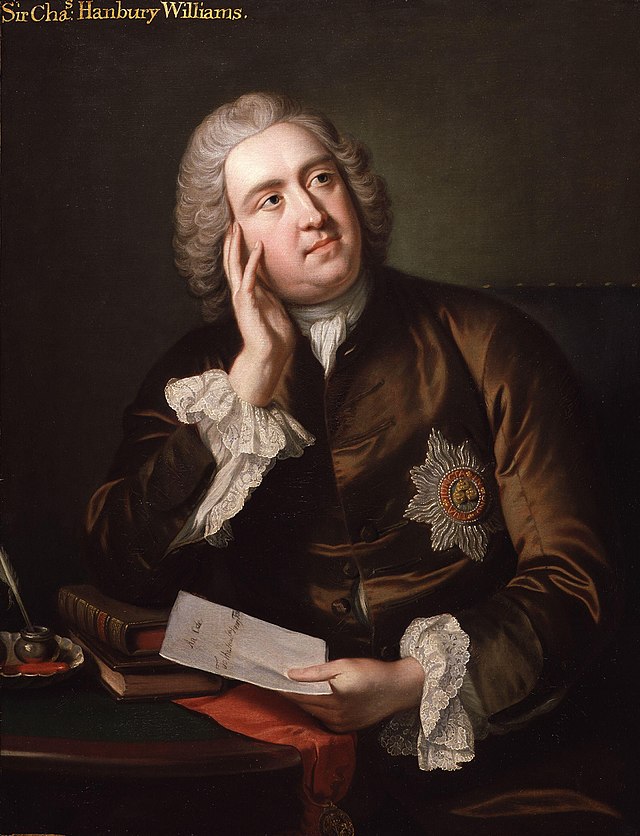Liste der britischen Botschafter in Russland
Wikimedia-Liste Aus Wikipedia, der freien Enzyklopädie
Liste der Botschafter des Königreiches Großbritannien, des Vereinigten Königreiches Großbritannien und Irland und des Vereinigten Königreiches in Russland und der Sowjetunion.
Botschafter im Russischen Kaiserreich
- 1707–1712: Charles Whitworth, 1. Baron Whitworth
- 1714–1719: Friedrich Christian Weber
- 1714–1715: George Mackenzie-Quin
- 1715–1716: James Haldane
- 1716: George Douglas, 2. Earl of Dumbarton
- 1718–1721: James Jeffereys (zog sich 1719 nach Danzig zurück)
- 1719–1730: Keine Diplomatische Vertretung
- 1728–1731: Thomas Ward
- 1731: John Campbell, 3. Earl of Breadalbane and Holland
- 1731–1739: Claud Rondeau
- 1733–1734: George Forbes, 3. Earl of Granard
- 1739–1742: Edward Finch
- 1741–1744: Cyril Wyche[1]
- 1744–1749: John Carmichael, 3. Earl of Hyndford
- 1749–1755: Melchior Guy Dickens

- 1755–1759: Charles Hanbury Williams
- 1759–1762: Robert Murray Keith
- 1762–1765: John Hobart, 2. Earl of Buckinghamshire

- 1764–1767: George Macartney, 1. Earl Macartney
- 1766–1767: Hans Stanley (ging nie nach Russland)
- 1767–1768: Henry Shirley
- 1768–1772: Charles Cathcart, 9. Lord Cathcart
- 1772–1775: Robert Gunning, 1. Baronet
- 1776–1783: James Harris, 1. Earl of Malmesbury
- 1783–1788: Alleyne FitzHerbert, 1. Baron St Helens
- 1788–1800: Charles Whitworth, 1. Earl Whitworth
- 1791: William Augustus Fawkener Spezialauftrag
- 1800–1801: Keine Diplomatische Vertretung während der Zweiten „Bewaffneten Neutralität“ 1800–01
- 1801–1802: Alleyne FitzHerbert, 1. Baron St Helens
- 1802–1804: John Borlase Warren, 1. Baronet
- 1804–1806: Granville Leveson-Gower, 1. Earl Granville
- 1805–1806: William Cathcart, 1. Earl Cathcart
- 1807: Alexander Douglas-Hamilton, 10. Duke of Hamilton Spezialauftrag
- 1807: Granville Leveson-Gower, 1. Earl Granville
- 1807–1812: Keine Diplomatische Vertretung nach dem Frieden von Tilsit
- 1812: Edward Thornton Bevollmächtigter mit Sitz in Stockholm
- 1812–1820: William Cathcart, 1. Earl Cathcart
- 1820–1825: Charles Bagot
- 1820–1824: Frederick Cathcart Bevollmächtigter Minister ad interim
- 1824–1825: Edward Michael Ward Bevollmächtigter Minister ad interim
- 1825–1826: Percy Smythe, 6. Viscount Strangford
- 1825–1828: Edward Cromwell Disbrowe Bevollmächtigter Minister ad interim
- 1828–1832: William à Court, 1. Baron Heytesbury
- 1828–1832: William Temple Bevollmächtigter Minister ad interim
- 1832–1833: Stratford Canning, 1. Viscount Stratford de Redcliffe (Formal Botschafter, aber er ging nicht hin)
- 1832–1835: John Duncan Bligh Bevollmächtigter Minister ad interim
- 1835–1837: John Lambton, 1. Earl of Durham
- 1837–1838: John Ralph Milbanke Bevollmächtigter Minister ad interim
- 1838–1841: Ulick de Burgh, 1. Marquess of Clanricarde
- 1841–1844: Charles Stuart, 1. Baron Stuart de Rothesay
- 1844–1851: John Bloomfield, 2. Baron Bloomfield
- 1851–1854: George Hamilton Seymour
- 1854–1856: Keine Diplomatische Vertretung während des Krimkriegs
- 1856–1858: John Wodehouse, 1. Earl of Kimberley
- 1858–1861: John Crampton, 2. Baronet
- 1861–1864: Francis Napier, 10. Lord Napier
- 1864–1867: Andrew Buchanan, 1. Baronet
- 1867–1871: George Vane-Tempest, 5. Marquess of Londonderry

- 1871–1879: Augustus Loftus
- 1879–1881: Frederick Hamilton-Temple-Blackwood, 1. Marquess of Dufferin and Ava
- 1881–1884: Edward Thornton
- 1884–1893: Robert Morier
- 1894–1895: Frank Lascelles
- 1895–1898: Nicholas Roderick O’Conor
- 1898–1904: Charles Scott (Diplomat)
- 1904–1906: Charles Hardinge, 1. Baron Hardinge of Penshurst
- 1906–1910: Arthur Nicolson
- 1910–1917: George William Buchanan
Botschafter in der Sowjetunion
- 1917–1924: Keine Diplomatische Vertretung nach der Oktoberrevolution
- 1924–1929: Robert Hodgson
- 1929–1933: Esmond Ovey
- 1933–1939: Aretas Akers-Douglas, 2. Viscount Chilston
- 1939–1940: William Seeds
- 1940–1942: Richard Stafford Cripps
- 1942–1946: Archibald Kerr, 1. Baron Inverchapel
- 1946–1949: Maurice Peterson
- 1949–1951: David Victor Kelly
- 1951–1953: Alvary Gascoigne[2]
- 1953–1957: William Hayter
- 1957–1960: Patrick Reilly
- 1960–1962: Frank Kenyon Roberts
- 1962–1965: Humphrey Trevelyan
- 1965–1968: Geoffrey Harrison
- 1968–1971: Archibald Duncan Wilson
- 1971–1973: John Killick
- 1973–1976: Terence Garvey
- 1976–1978: Howard Frank Trayton Smith
- 1978–1982: Curtis Keeble
- 1982–1985: Iain Sutherland
- 1985–1988: Bryan Cartledge
- 1988–1991: Rodric Braithwaite
Botschafter in der Russischen Föderation
- 1991–1992: Rodric Braithwaite
- 1992–1995: Brian Fall
- 1995–2000: Andrew Wood
- 2000–2004: Roderic Lyne
- 2004–2008: Anthony Brenton

- 2008–2011: Anne Fyfe Pringle
- 2011–2016: Tim Barrow
- 2016–2020: Laurie Bristow
- 2020– : Deborah Bronnert
Siehe auch
Einzelnachweise
Wikiwand - on
Seamless Wikipedia browsing. On steroids.